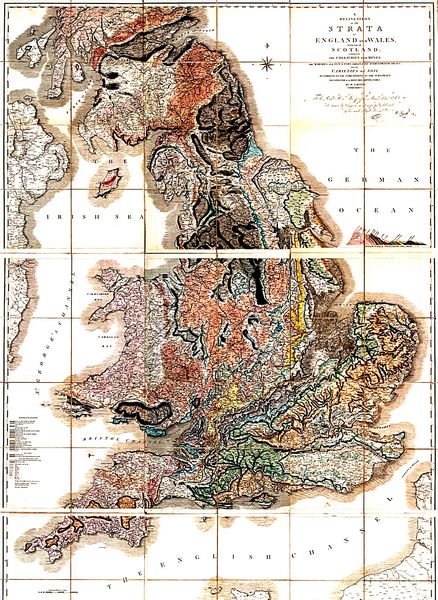Athena Review Image Archive ™
Smith's Geological map of Britain (1815)

The first geological map of Britain (Smith 1815).
William "Strata" Smith (1769-1839) was an English mining engineer and geologist who accurately mapped geological strata throughout Britain and first defined many index fossils. The modern science of geology in Britain literally began when Smith, working as a canal surveyor, made the first accurate geologic maps of England and Wales.
Smith was the first to clearly describe local units of stratigraphy, or the correlation of layers and their contents, as organized geological formations, used in recording both the geologic history of the earth and the fossil record of related organisms and their development.
From
the 1790s onward, Smith created a series of geologic maps throughout
the counties of England and Wales, leading to the first accurate
description of geological formations throughout Great Britain. These
maps he published at his own expense in 1815. Smith also published, the
following year, an illustrated guide to the index fossils of each
geological stratum described in the maps. Since Smith had no academic
credentials, however, his maps and fossil reports were at first ignored
by established scientists – while the maps were freely plagiarized by
publishers. Smith meanwhile went deeply into debt and was even placed
in debtors prison for several years.
Belatedly, his pioneering
work was recognized as a major step forward by the Geological Society
of London, which in 1831 gave Smith its first medal for outstanding
achievement in geology. Smith’s interest in fossils was taken up by his
nephew, John Philips, who went on to become a well-known English
palaeontologist during the Victorian era. Philips was the first to list
most of the geological periods as they are recognized
today.
References:
Smith, William 1815. Geological Map of England and Wales.
Copyright © 1996-2020 Rust Family Foundation (All Rights Reserved).